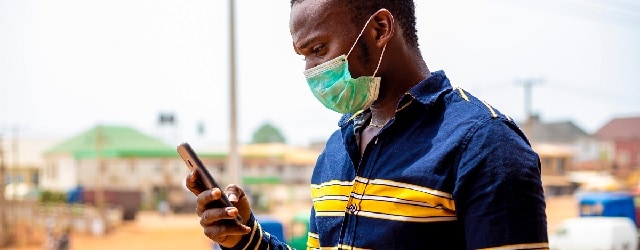Within Sub-Saharan Africa, mobile money providers have waived or reduced transaction fees while governments are encouraging digital payments as a strategy to wean off person-to-person contact.

The COVID-19 pandemic has pushed Kenya Commercial Bank (KCB), east Africa’s largest lender by asset base, to work remotely and accelerate migration towards digital banking platforms.
KCB’s CEO Joshua Oigara told Global Finance: “The pandemic has brought in a new way of thinking with regards to the work environment. We are now able to run our business with some staff working from main sites, secondary stations and others from home. These are options which had not been fully explored before. But we are now likely to see this shift gaining more prominence into the future.” He added that migrating transactions from branches to digital channels like mobile, agents and internet banking will now be given top priority.
Sub-Saharan Africa’s economies are almost exclusively cash-driven given that only 43% of the adult population has an account with a bank or with a mobile money service provider according to the World Bank (WB), rendering banking branch networks indispensable.
Countries around the world have embraced digital payments as a contactless means of getting money to citizens but in Sub-Saharan Africa, the lack of financial inclusion is an obstacle, says Anit Mukherjee, a policy fellow at the Center for Global Development, a US-based think tank.
“The lack of bank and mobile money accounts is the biggest gap in digital readiness in Sub-Saharan Africa. It’s difficult to get money to citizens who don’t have either,” Mukherjee told Reuters.
In East African countries including Kenya, Uganda and Tanzania, mobile money is already the currency of choice for purchases ranging from buying a newspaper to paying hospital bills—driven largely by the success of Safaricom’s service M-Pesa, a mobile payments system started in Kenya in 2007 that now boasts 30 million users in 10 countries.
In West Africa, only about one in four adults use mobile money, with industry experts and analysts saying the outbreak could be an opportunity to increase usage and bring more people into the digital economy.
According to Jill Shemin, an indepedent consultant on digital finance in West Africa, the pandemic is a trigger that could dramatically increase usage of digital platforms including within the banking sector.
Within Sub-Saharan Africa, mobile money providers have waived or reduced transaction fees while governments are encouraging digital payments as a strategy to wean off person-to-person contact and hopefully slow the spread of COVID-19.
Martin Kirimi, a Senior Associate, research, Standard Investment Bank, Kenya notes the volume of money transfers within the region still happens at the bank’s branch level.
“The branch network is indispensable. And despite the speedy momentum to digitize African economies and the uptake towards the digital banking platforms, the volume of money transfers happens, for now, within the branch network. Disproportionally, tier one lenders in Africa are the ones that you find being zealous about digitizing all their operations. And they make up less than 30% of the banks in African states which arguably means transactions will be cash driven because the rest of the population with bank accounts will be frequenting the competition,” says Kirimi.
For KCB, the focus on driving digital transactions saw non branch transactions rise to 97% in first-quarter 2020 up from 94% in first-quarter 2019 driven mainly by mobile, internet and agency banking while non-branch volumes increased by 31% . Branch transactions decreased by 8% on channel migration initiatives in results announced mid this May.



